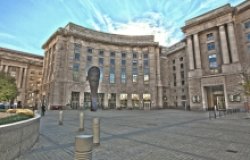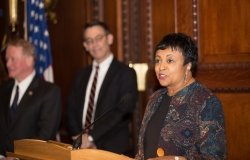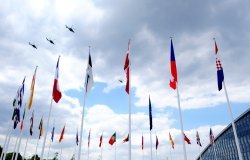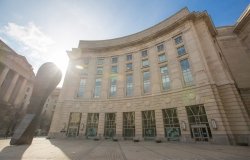Water @ Wilson: 50 Years of Water, Conflict, and Cooperation
On the occasion of the Wilson Center's 50th anniversary, the Environmental Change and Security Program and nine co-sponsoring programs convened experts from government, the NGO sector, and academia for a comprehensive look at the first year of the U.S. Global Water Strategy and new research and practice on water, peace, and conflict.
Overview
50 Years of Water at Wilson: Water, Conflict, and Cooperation (Part 1 of 2)
A number of countries across North Africa, the Middle East, into Central and South Asia are “at risk of failure if they can’t get the water equation right,” said Aaron Salzberg of the U.S. Department of State, at a recent Wilson Center event celebrating 50 years of working on water’s connection to conflict and cooperation. The event brought together experts from government, NGOs, and academia for a comprehensive look at the first year of the U.S. Global Water Strategy and new research and practice on water, peace, and conflict. Either now or sometime in the near future, said Salzberg, if fundamentally water insecure countries lacking access to sustainable supplies of safe drinking water and basic sanitation do not address their water problems, they will face increased risk of failure and greater fragility.
“At the core of our contributions to the strategy is strengthening governance and institutions and mobilizing innovative financing to help partner countries provide their citizens with affordable, equitable and sustainable access to safe water and sanitation,” said James Peters, Acting Global Water Coordinator with the U.S. Agency for International Development (USAID).
Sustainable Infrastructure
Many defensive systems, such as dams, are underperforming or failing in the face of flooding and other natural disasters, said John Matthews, Lead and Co-Founder of the Alliance for Global Water Adaptation. “The trouble is, we have a very limited understanding of exactly how near collapse, or breakdown, or failure, much of our infrastructure is,” said Richard Matthew, Director of the Blum Center for Poverty Alleviation at University of California, Irvine.
Part of the problem is that our infrastructure is developed without long-term consideration to sustainability. Instead, said Matthews, projects are driven by a finance period, a political agenda, or private sector interests. Climate change is an opportunity to rethink how we think about sustainability itself.
Improvements in big data management, modeling, and high-resolution mapping tools can facilitate sustainable solutions and boost stakeholder engagement. “To be useful, tools have to provide the right information in the right resolution,” said Matthew. Instead of crude visuals of climate change at a global scale, models can now be built in foot by foot grids, providing powerful and technical visual aids to local communities forecasting and planning for the changing climate and potential humanitarian crises.
Climate-Proofing and Resilient Development
Climate change “will mean more forced displacement and more desperate conditions for displaced people,” said Syed Imran Ali, Fellow in Global Health and Humanitarianism at the Dahdaleh Institute for Global Health Research. Lack of data related to water can lead to a healthcare emergency. Insufficient information about the hydrology at the site of Jamam refugee camp in South Sudan meant the combination of flooding and inaccessible groundwater created a situation where “there was water everywhere but nothing to drink,” from 2012 to 2013, said Ali. The following crisis saw waterborne diseases tear through the camp until water sanitation could be brought under control. Investing in water and sanitation infrastructure in both camps and host communities will create more resilient communities and make it possible to maintain minimum humanitarian standards.
“We need to get the risk assessment right,” said Janani Vivekananda, Senior Advisor for climate change and peacebuilding at adelphi. The UN Security Council recently released a report calling for better risk assessment and management in the Lake Chad region. Some believe the lake is shrinking, so they endorse piping water in. But Vivekananda said the issue is not one of water scarcity, but of variability and uncertainty. The lake has natural periods of expansion and shrinkage and communities have adapted their livelihoods according to those patterns. Unpredictable changes in precipitation patterns have made it difficult for local communities to sustain their livelihoods, especially given the instability and conflict in the region. Improved risk assessment and planning can alleviate the stress on their livelihoods and ensure that “peace is climate-proof,” said Vivekananda.
Conflict and Cooperation
Millions around the world “lack access to a sustainable supply of safe drinking water and to basic sanitation,” which can impede economic development, factor into migration and civil unrest, and “aid in terrorist recruitment,” said Aaron Salzberg. Also, water insecurity could destabilize states and thereby affect U.S. national security interests, he said.
It is a myth that water inherently causes interstate war, said Scott Moore, but it can spark tensions at the subnational level. Countries are prone to disagreement over transboundary water resources, such as the Nile River and the Indus River. Yet, they nonetheless construct shared infrastructure and institutions to ensure that their citizens get enough to drink. In fact, in the best cases, “water is a fantastic tool to build trusting cooperation and to strengthen regional integration,” said Salzberg, noting that it can create ties that will stabilize regions across the world.
Strengthening Governance and Institutions
Effective governance and leadership on water issues moving forward will be foundational to progress. “It’s critically important to have a shared vision and plan for sustainable water resources and management across boundaries,” said Melissa Ho, Vice President of Fresh Water at the World Wildlife Fund. The shared plan must value both nature and people. “It’s not an either or,” she said. “They go together.” Expanding on this idea, John Parker, Deputy Director of the Sustainable Water Partnership at Tetra Tech said, “Progress on transboundary water cooperation requires sustained engagement and partnerships.”
“It is absolutely critical to engage stakeholders at the outset of any process and [to] have them really lead that process” said Parker. Aaron Wolf, Professor of Geography at Oregon State University, explored why certain ideas catch on. “What motivates people to do the things they have done?” he said. “And what motivates people as we move forward?” One tool we have, Wolf said, is the “elaborate” relationship people have with water. We have allies in this drive to shift the way we do things, he said. Wolf pointed to a number of popular water festivals, illustrating better ways of motivating society to care for its water resources by speaking to people on a more visceral level. Similarly Wolf identified the faith community as an ally in water conservation moving forward.
Looking Forward
“When I think about how we’ll manage water differently 30, 40, 50 years from now, I see three big trends coming,” said Ken Conca, Professor of International Affairs for American University in response to the many global needs brought to the fore by earlier speakers. “We will be storing a lot more water, we’ll be recycling a lot more water, and we’ll be thinking much more systematically and foundationally about flood risk.” To achieve this, said Conca, we will have to better manage the “micro-considerations” and more effectively anticipate unintended consequences because for many people, those unintended consequences are the real story.
Written by Elizabeth Wang & Truett Sparkman
50 Years of Water at Wilson: Rising New Ocean, Endangered Villages, Plastic Pollution (Part 2 of 2)
In the Arctic, “a new ocean has emerged and we have to deal with it,” said Mike Sfraga, Director of the Wilson Center’s Global Risk & Resilience Program and Polar Institute at a recent water event celebrating the Wilson Center’s 50th anniversary.
Climate change has brought the ocean to the doorstep of indigenous villagers in Newtok, Alaska. “Newtok is being eaten away by a river that’s eroding because the permafrost is melting” and bombarded by storms, said Sfraga. The village is also in imminent danger of losing its water supply, and it is not alone. In Alaska, climate change is putting 32 to 36 villages in harm’s way. It will cost between $120 and $150 million to move these communities, Sfraga added. “So whether it’s Fort Lauderdale, or Fort Yukon, Alaska, it’s the same issues. Different scales, but same issues.”
In terms of natural disaster and climate change impacts, “By area, islands are the top 20 countries,” said Roger Pulwarty, Senior Scientist at the National Oceanic and Atmospheric Administration. While we may think of the Caribbean as being vulnerable to hurricanes, “the biggest risk in the region is water supply,” Pulwarty said, noting that water use during Jamaica’s tourist season is 10 times its annual rainfall. In response to these growing challenges, the region is developing innovative programs like the Caribbean Catastrophic Risk and Insurance Facility. “The idea is to pay people just enough to restart their business and their lives,” said Pulwarty.
Another ocean concern is marine life. Deirdre Warner-Kramer, Acting Deputy Director of the State Department’s Office of Marine Conservation said, the “fish don’t know where those lines are,” referring to the demarcations between countries’ exclusive economic zones. Fisheries are an international resource, which we struggle to manage. Illegal, unreported, and unregulated (IUU) fishing is a global problem. In addition, fishing vessels can be used for smuggling people, guns, drugs, and contraband. There are “direct connections between illegal fishing and terrorism and piracy,” she said.
International collaboration offers hope for our oceans. The Artic Council’s fishing moratorium, and maritime pacts like the Agreement on Port State Measures to Prevent, Deter and Eliminate Illegal, Unreported and Unregulated Fishing bring countries together to pool resources, to make fisheries sustainable, and to ensure food security for all.
“Scientists estimate that by 2050, there will be more plastic in the ocean than fish,” said Dell’s Senior Director of Global Public Policy, Rebecca Karnak. Looking toward the future, we need to think hard “about how we can be more efficient with resources and how we redefine waste,” she said. Dell is working to build the first commercial-scale global ocean-bound plastics supply chain.
Dell’s approach has been “to intercept ocean-bound plastics in areas with the highest concentration of materials,” like South Asia, said Karnak. The company started with feasibility work in Haiti and has used ocean-bound plastics in packaging and its popular products. It hopes to expand these efforts with the continued help of NGOs and other companies.
From retreating shorelines and sea-level rise to plastic pollution and endangered marine life, we are facing seas of change. The Arctic Council, the Port State Measures agreement, and private sector innovations offer ways forward but also highlight the hurdles ahead.
Read More:
- The battle over one natural resource—fish—has long been overlooked.
- Ocean warming and human activity is wreaking extensive damage on the world’s marine life.
- As the toll from natural disasters climbs higher, we need a “human security approach” to disaster planning.
- Is the world ready for the strategic challenges global warming will bring to the Arctic?
Written by Olivia Smith
Documents & Downloads
- Syed Imran Ali: At the margins of survivability | Water stress, climate change, and refugee/IDP campsDownload
- Melissa Ho, Panel 3 | The Future of Water Peace PresentationDownload
- Rebecca Karnak: Building a Legacy of Good Download
- Richard Matthew: Panel 1 | The New Face of Water Conflicts Download
- Scott Moore: Water and Conflict | Three MythsDownload
- John Parker: Improving Transboundary Water Cooperation in the Mara River Basin Download
- Roger Pulwarty: Panel 2| Oceans of Cooperation Download
- Mike Sfraga: Navigating the Arctic's Seven C'sDownload
- Janani Vivekananda: Breaking the Conflict Trap | Water Governance and Conflict in Lake Chad Download
- Deirdre Warner-Kramer: Sharing What’s in the Water: What are the Rules?Download
- Aaron Wolf, Lessons from 25 Years as a Hydropolitical PracademicDownload
- John Matthews: Certain Change, Uncertain ResilienceDownload
Speakers

Jane Harman
Syed Imran Ali

Cynthia Brady
Former Peacebuilding and Resilience Advisor (2018-2019) & Senior Peacebuilding and Conflict Advisor (2005-2018) U.S. Agency for International Development (USAID)
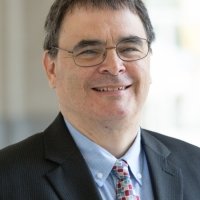
Ken Conca
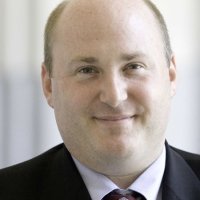
Geoffrey D. Dabelko, PhD
Professor and Associate Dean, George V. Voinovich School of Leadership and Public Affairs, Ohio University; Associate Senior Fellow, Environment of Peace Initiative, Stockholm International Peace Research Institute
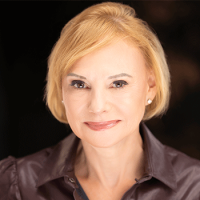
Sherri Goodman
Author, Threat Multiplier: Climate, Military Leadership & the Fight for Global Security, coming in 2024.
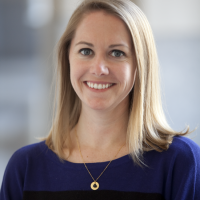
Lauren Herzer Risi
Melissa Ho
Rebecca Karnak
Richard Matthew
John Matthews

Scott Moore
John Parker
James Peters
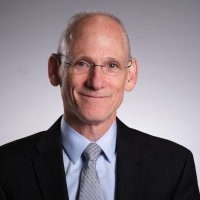
Aaron Salzberg
Director of the Water Institute at the University of North Carolina
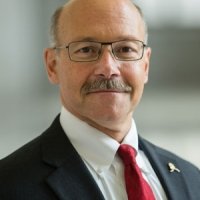
Dr. Michael Sfraga
Janani Vivekananda
Deirdre Warner-Kramer
Aaron Wolf
Hosted By

Environmental Change and Security Program
The Environmental Change and Security Program (ECSP) explores the connections between environmental change, health, and population dynamics and their links to conflict, human insecurity, and foreign policy. Read more

Global Risk and Resilience Program
The Global Risk and Resilience Program (GRRP) seeks to support the development of inclusive, resilient networks in local communities facing global change. By providing a platform for sharing lessons, mapping knowledge, and linking people and ideas, GRRP and its affiliated programs empower policymakers, practitioners, and community members to participate in the global dialogue on sustainability and resilience. Empowered communities are better able to develop flexible, diverse, and equitable networks of resilience that can improve their health, preserve their natural resources, and build peace between people in a changing world. Read more

Africa Program
The Africa Program works to address the most critical issues facing Africa and US-Africa relations, build mutually beneficial US-Africa relations, and enhance knowledge and understanding about Africa in the United States. The Program achieves its mission through in-depth research and analyses, public discussion, working groups, and briefings that bring together policymakers, practitioners, and subject matter experts to analyze and offer practical options for tackling key challenges in Africa and in US-Africa relations. Read more

Indo-Pacific Program
The Indo-Pacific Program promotes policy debate and intellectual discussions on US interests in the Asia-Pacific as well as political, economic, security, and social issues relating to the world’s most populous and economically dynamic region. Read more

Brazil Institute
The Brazil Institute—the only country-specific policy institution focused on Brazil in Washington—works to foster understanding of Brazil’s complex reality and to support more consequential relations between Brazilian and US institutions in all sectors. The Brazil Institute plays this role by producing independent research and programs that bridge the gap between scholarship and policy, and by serving as a crossroads for leading policymakers, scholars and private sector representatives who are committed to addressing Brazil’s challenges and opportunities. Read more

China Environment Forum
Since 1997, the China Environment Forum's mission has been to forge US-China cooperation on energy, environment, and sustainable development challenges. We play a unique nonpartisan role in creating multi-stakeholder dialogues around these issues. Read more

Latin America Program
The Wilson Center’s prestigious Latin America Program provides non-partisan expertise to a broad community of decision makers in the United States and Latin America on critical policy issues facing the Hemisphere. The Program provides insightful and actionable research for policymakers, private sector leaders, journalists, and public intellectuals in the United States and Latin America. To bridge the gap between scholarship and policy action, it fosters new inquiry, sponsors high-level public and private meetings among multiple stakeholders, and explores policy options to improve outcomes for citizens throughout the Americas. Drawing on the Wilson Center’s strength as the nation’s key non-partisan policy forum, the Program serves as a trusted source of analysis and a vital point of contact between the worlds of scholarship and action. Read more

Middle East Program
The Wilson Center’s Middle East Program serves as a crucial resource for the policymaking community and beyond, providing analyses and research that helps inform US foreign policymaking, stimulates public debate, and expands knowledge about issues in the wider Middle East and North Africa (MENA) region. Read more

Polar Institute
Since its inception in 2017, the Polar Institute has become a premier forum for discussion and policy analysis of Arctic and Antarctic issues, and is known in Washington, DC and elsewhere as the Arctic Public Square. The Institute holistically studies the central policy issues facing these regions—with an emphasis on Arctic governance, climate change, economic development, scientific research, security, and Indigenous communities—and communicates trusted analysis to policymakers and other stakeholders. Read more

Science and Technology Innovation Program
The Science and Technology Innovation Program (STIP) serves as the bridge between technologists, policymakers, industry, and global stakeholders. Read more

Urban Sustainability Laboratory
Since 1991, the Urban Sustainability Laboratory has advanced solutions to urban challenges—such as poverty, exclusion, insecurity, and environmental degradation—by promoting evidence-based research to support sustainable, equitable and peaceful cities. Read more
Thank you for your interest in this event. Please send any feedback or questions to our Events staff.



